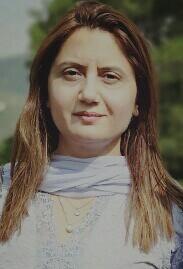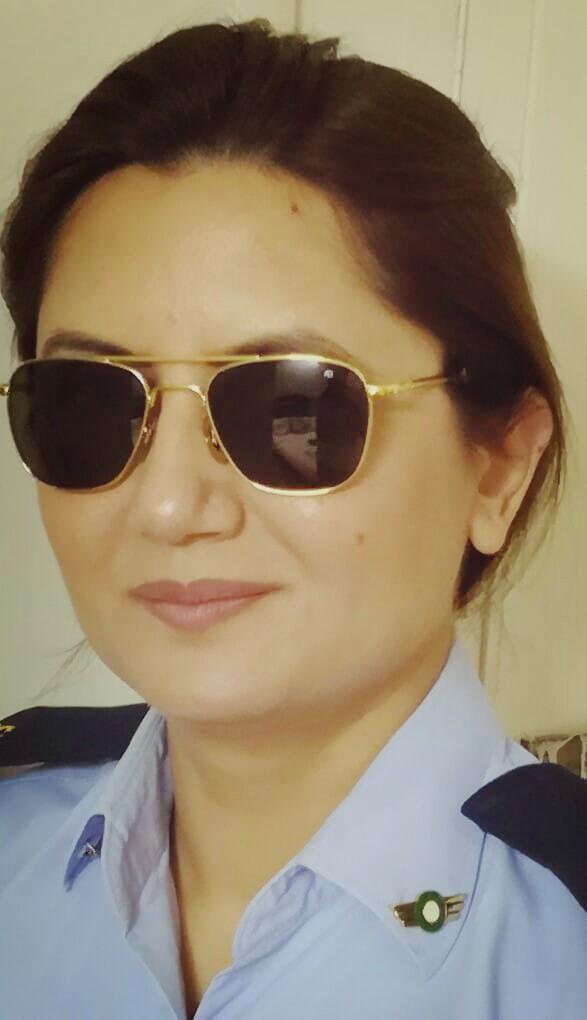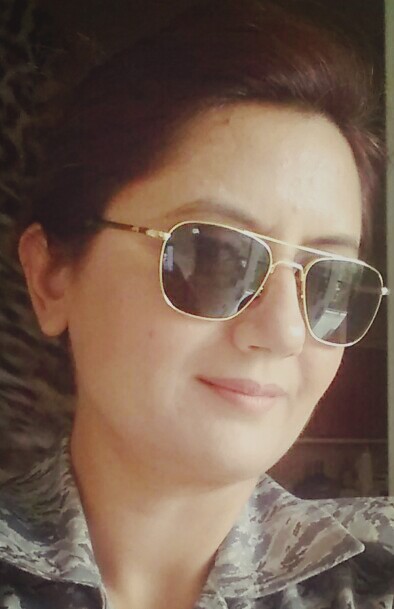Today’s digitalized world is characterized by the connectivity provided by internet, smartphones, tablets, smartwatches and smart glasses. While on one hand, this connectivity has opened a plethora of innovations such as the Internet of things (IoT), whereby everything can be controlled from within the touch of fingertips, it eventually gives rise to the big threats such as National and global security. Increasing incidents of cyber-attacks, cyber-theft and bullying point to nowhere but an imminent threat of regional or global cyberwar.
While it is a general misperception that Pakistan does not have any contributions in the field of Science and Technology and that women are discouraged from education, let alone pursue STEM, Dr, Fauzia Idrees Abroo, Pakistan’s first female cyber-security analyst, is a pleasant surprise for many science enthusiasts.

Dr. Abro started her educational career when she obtained her Bachelor of Engineering in Electronics from Mehran University of Engineering and Technology (MUET), Jamshoro. She hails from rural Sindh and despite all the hurdles against the education of women, she pursued her passion and obtained masters in Cryptology from NUST. This was just a beginning in her career which took her to pursue a Ph.D. in Cyber Security from City, University of London.
Her research interests are malware analysis, detection and prevention, mobile security, VoIP, network security, machine learning, IoT and Artificial Intelligence, most of them have been published in various academic journals and conference proceedings. She serves on several editorial boards and program committees of international journals and conferences.
Currently, she is working on the security of the Internet of Things (IoT). This scribe had a chance to interact with Dr. Abro, who is Pakistan’s first female with a doctorate in Cyber Security from a foreign University, the first female Ph.D. of Pakistan Armed Forces (Tri-services) as well.

Following are the excerpts from my conversations with Dr. Abro.
Let us know about your childhood and who inspired you most during your academics?
I belong to a remote area of Sindh. Life was quite hard, getting an education was extremely difficult due to social and cultural problems. I used to study a lot because I always dreamed of becoming an outstanding professional. I was lucky to get an unending support from my family. Today, I have everything one can dream for and I’m content that all is earned through sheer hard work. During my studies in Pakistan, I was inspired by my mentor Professor Bhawani Shankar who has been supporting and helping out many students of Pakistan to excel through their education. I’m also inspired by Professor Rahman Aziz of City University London who has never stopped supporting thousands of students from all over the world.
Do you encounter obstacles in your life and career? How do you manage and what will you suggest for working ladies in Pakistan?
Yes, I do, especially in my career. I opted for Engineering and Military, both being male-dominated fields and especially in third world countries like Pakistan, there are people who do not support women in male-dominated fields. There is a big list of obstacles from gender discriminations to biases against working women and mothers of young children. I have two children and before each of them, I had to go through miscarriages due to non-conducive working conditions.
I knew that I had to be strong, communicative and competent to survive in order to see my dreams turn into reality. I had to give extra time to my work to fill the gaps created during my absence due to maternity leaves. I was able to manage the circumstances with selfless support from my husband. I would not be where I am today without his support after my marriage. I would suggest to the working ladies, work hard and keep a balance between family and work life. There is no peace without a peaceful family life and there is no happiness without. Don’t isolate yourself in workplaces, be active, inclusive and participate in activities positively. Try to minimize the communication gap between you and the people you work with.
You have diverse academic experience from being an electrical engineer to cryptologist. What were the factors which led you to pursue these fields?
I joined Pakistan Air Force as an Electronics Engineer and was trained to work on avionics systems besides networks, IT and electronics equipment. I had an interest in security and luckily PAF selected me for Masters in Cryptology/information security to fulfill its cryptology and cyber security requirements. After my masters, I assigned to work in information/network security which further increased my interest in cyber security. Eventually, I was selected for European Union scholarship for Ph.D. from the UK. My work experience in PAF Cyber security setup and my Ph.D. in Information security have contributed to my career choice. Now it has become my hobby, career and something I’m passionate about.
We should realize that each smart gadget is not very smart against cyber threats and each social media application is accruing our personal information from our gadgets.
The concept of security has evolved from the traditional security dilemma of a state to the vulnerabilities faced by individuals. What are the threats and challenges faced by individuals and states in the context of cyber security?
With the ever-increasing role of internet in almost everything we do, we’re more and more vulnerable to cyber threats. Anyone using the internet for anything is exposed, hence awareness about requisite security measures is extremely essential for each individual. It’s an ever-evolving field which requires persistence and continuous focus of both the developers and end-users. Although, every organization is conscious of the threat and ensures regular measures but still we see so many breaches all over the world very frequently. This implies that the importance of cyber security will always remain extremely critical for both individuals and organizations all over the globe.
The emergence of cyberspace has opened new battlegrounds. How will future developments in cyberspace and new technologies shape any future warfare?
Almost all contemporary and future concepts of warfare have a very heavy dependence on cyberspace. With the emergence of super computational technologies and rapid developments in associate gadgetry, each segment of cyberspace is being exploited as an essential tool of warfare. A paradigm shift in warfare is that cyber warfare is now an everlasting activity which would only intensify in times to come.
What can be done at an individual level to get secured from cyber threats?
First of all, each individual should get himself acquainted with the potentials and impact of cyber threats on our daily life. Usage of social media is increasing and so are the chances of cyber threats for the users. We need to educate especially our children to be careful while sharing their personal information on social media. We should realize that each smart gadget is not very smart against cyber threats and each social media application is accruing our personal information from our gadgets.
We must know that Cameras, Mics and our files in our gadgets are accessible to cyber attackers. We need to be careful about what are we sharing on social media, storing on our smart devices and how are we accessing the internet. Use strong passwords for online services accounts, install good anti-virus programs and update the software regularly.
Are there any global efforts done by the international society and bodies to overcome the threats of cyberwar between states or any cyber-attack by a group or individual?
There are international bodies that are monitoring the hackers and cyber activities but we must know that all international intelligence agencies are intensely involved in cyber monitoring and are using individual’s data for their covert activities. There are on-going global efforts by UN, Council on foreign relations and some other international organizations and think tanks for regulating the cyberspace especially in terms of cyber-attacks and cyber warfare.
Pakistan drafted its cyber security policy in April 2019. Is this policy comprehensive enough to tackle the challenges faced by Pakistani users and state?
As per my knowledge, some work was kick-started to formulate the cyber security policy guidelines but it’s not complete yet. Cyber security policy is a subject which needs to be reviewed very frequently and should be formulated by competent professionals with the involvement of different stakeholders of the state.

You are currently working on IoT (Internet of Things). Let us know about the latest developments and challenges in this technology?
The Internet of Things (IoT) is a rapidly growing network of connected smart sensors/devices. It is becoming the foundation of many services such as smart homes, smart cities, health monitoring, agriculture system, smart environment, and smart water control systems. IoT will bring the next Industrial Revolution because it’s changing the way people live, work and communicate.
In 2017, around 29% of organizations had already installed IoT technology (Vodafone IoT Barometer, 2017-18). According to research by management consulting firm Bain, the IoT market is set to grow to around £397 billion by 2021, more than double the £179 billion that was spent in 2017. It is envisaged that by 2020, the number of connected devices will rise to 20.4 billion worldwide (Gartner report 2017) and the global IoT devices market is expected to reach around USD 158,140 million in 2024 (Zion report 2018).
As IoT continues to expand, the number of challenges the emerging technology faces is also on increase. The main concern is the availability of connectivity, data integrity, big data, security and privacy of connected devices, cloud and network.
You got several awards including the Mohtarma Fatima Jinnah and Benazir Bhutto lifetime achievement award. What are your future targets to achieve and your future research plans?
I always try to motivate and encourage our young students especially the females to opt for STEM studies. I would also like to work on drone security. I have started an organization for women: Women in Science, Technology, Engineering & Mathematics (WiSTEM) to help and support the women working or studying STEM. I’ll continue working for the empowerment of women. I’ll be using the WiSTEM platform to work for equal opportunities for women. As for as my research is concerned, I will be working on IoT security especially the intrusion detection system for IoT connected devices.
What is next for you? Your message for womenfolk in Pakistan?
I try to remain abreast with the latest research and development in the domains of cyber security. I see myself as a leading cyber security entrepreneur in the next five years providing its products and services worldwide. I’m an enthusiast to provide a flexible and conducive working platform for women in cyber security and STEM.
My message to women of Pakistan is to work hard and know their potentials. Only courage can lead to success and motivate others who struggle to survive in very challenging environments. To get something extra you need to do extra.
READ ALSO: A Talk with Dr. Fariha Hasan on Astrobiology https://scientiamag.org/a-talk-with-dr-fariha-hasan-about-astrobiology-and-career/

Muhammad Abdullah Khan has done bachelors in Chemistry from Government College University
Lahore. He is a science enthusiast and loves to read and write about astronomy, cosmology and latest
scientific endeavors.

